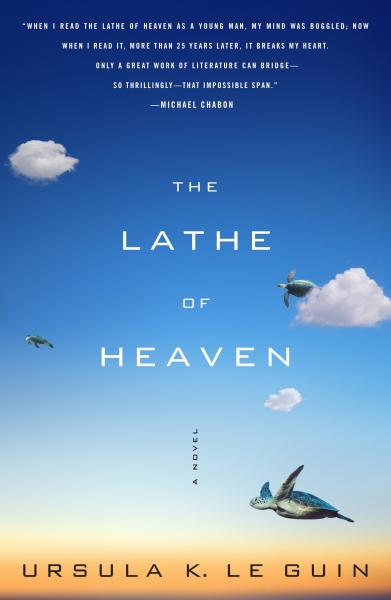The Lathe of Heaven is a short novel, and one that holds a special place in my heart. It was the third grown-up science fiction novel I read when I was twelve years old, after The Dispossessed and King and Joker. I didn’t understand a word of it but I loved it anyway.
The Lathe of Heaven is about George Orr, a man who has dreams that change reality, and he’s afraid of having those dreams. He gets sent to a psychiatrist, Haber, who becomes fascinated with changing reality. He then finds a lawyer, Heather LaLeche, who he hopes will rescue him from Haber as the world changes around them. It’s his dreams that change reality, and dreams produce answers from the subconscious to questions rationally asked. Dreams are not daydreams. Asked to produce peace on earth, George dreams of alien invasions; asked to solve overcrowding, he dreams of a plague fifteen years ago that killed off six billion people. When he wakes up, the world has always been that way, and that’s how everyone remembers it except for those in the room with him.
What makes the book brilliant is that it’s told from the points of view of the three central characters, and they’re all real. George Orr is naturally worried about having this ability. Haber wants to use the power to do good, he’s essentially benevolent but has no sense of proportion. Heather LaLeche is the most interesting of them all. She’s a black civil rights lawyer. When everyone becomes grey (and has always been grey—Haber told George to solve the problem of racism) she doesn’t exist because her blackness is an essential part of what has made her. Then George does manage to evoke her in that world, and she’s different, as a grey person. Her point of view is the most interesting of all. The book cycles through their points of view in order, and in the grey world, while she’s missing, the point of view remains with George and that asymmetry reflects the asymmetry of a world without her. I’m sure I didn’t consciously notice that the first time I read it, I’m not sure when I consciously noticed it, but I think any reader would unconsciously notice it.
The changing world is evoked rather than described—you mainly see the changes to the world through the changes to the people, and you see some of the smaller changes more than some of the bigger ones. The aliens are wonderful, but again seen very briefly—I most like the way that after they are revealed never to have been a menace there’s one running a junk shop.
People have sometimes compared this book with Philip K. Dick’s work with shifting realities, especially Ubik and Eye in the Sky. The real difference is that Dick liked to torture his characters, and he often didn’t distinguish them enough for anyone to care about them anyway. Le Guin wrote a novel about the effect of world-changing on three-dimensional characters. Philip Dick wrote world-changing from the point of view of alienated, miserable people nobody could care about. Le Guin wrote from a position of hope and Dick from a position of existential despair. There may not be any difference, except in whether I enjoy reading the result or not.
Jo Walton is a science fiction and fantasy writer. She’s published eight novels, most recently Half a Crown and Lifelode, and two poetry collections. She reads a lot, and blogs about it here regularly. She comes from Wales but lives in Montreal where the food and books are more varied.










